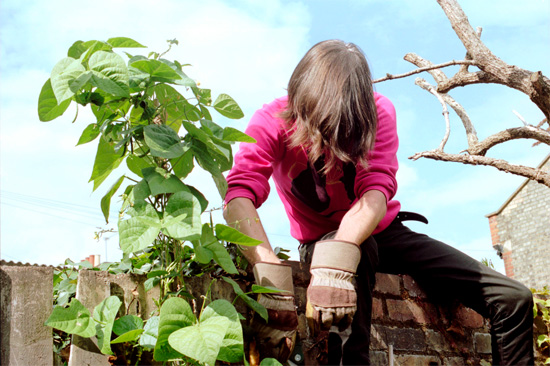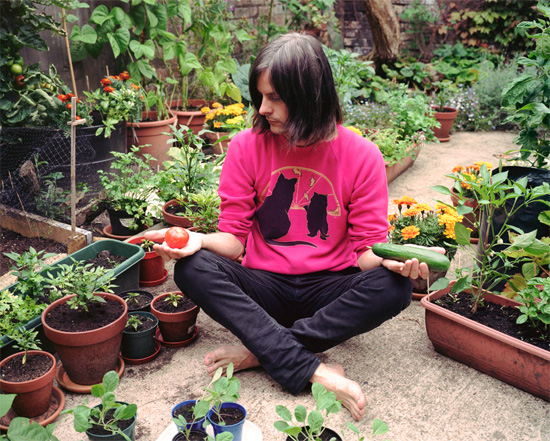Photography courtesy of Cat Stevens. Originally published in The Plant journal
Simon Petrovitch is a rock musician who lives in a flat with his girlfriend Ros, in Haringey, North London. He describes it as, "one of those Zone 2, Zone 3 areas that’s still really cheap to live in because there’s no tube station outside the front door". Haringey may be a typically urban area but it is still dotted with enough green stretches of conservation land, parks and nature trails that the honey produced by the local Finsbury Park Bee Keepers Association and their hives is praised across the country for its fine taste.
He is the guitarist in a once two piece, now three piece rock band called Comanechi, who were described by NME as "a 1,000 volt wake-up call" and awarded their debut album Crime Of Love 9/10. (Their second album You Owe Me Nothing But Love is out now and is a monstrous assault on your rock glands and sense of well-being.) When not out on tour or in the studio, Simon works in post-production for a TV company. But his main passion outside of music is tending to his herb and vegetable garden.
Tell me about how this little droplet of green paradise in the city first became yours.
Simon Petrovitch: When I first moved into this flat, you couldn’t get into the garden because there were four rusty barbeques and a lot of smashed up furniture in it. This had just been thrown down there by the people who lived upstairs. They’d lived up there for ten years and they’d basically fly-tipped it to the point where they couldn’t use it. They would just throw any furniture they didn’t want or was broken down the stairs. And the people who lived in this flat never went into the garden. At the time I was really hard up because I was recording and touring with Comanechi, so I was basically skint. So I saw the garden as a way of saving money.
How did you get it ready?
SP: I had a car at the time and luckily there was a rubbish dump just a few hundred yards down the road which the people upstairs had never bothered going to. So I just filled the car up and got all the rubbish out. I bought some window boxes and planted loads of herbs, rocket and garlic, purely to save money really because I really hate buying those scratty little bags of herbs that go off before you’ve even opened them. And those £2 bags of rocket as well. My grandma lives in Italy and when she makes a salad she just goes into the garden and grabs a couple of leaves.
The taste is always sharper if you grow it yourself.
SP: Yeah. That is something I came to appreciate, even if it wasn’t the initial motivation. The next thing I noticed was that fresh garlic and strawberries growing out there taste nothing like what you get in the shops. It was an epiphany tasting them for the first time. Being in a band, you often have dead time or down time with nothing to do, so I had time to tidy the garden up, so within the first year I had a lot of herbs and garlic. The first time I picked one of my own tomatoes was an amazing moment. You realise you’ve been eating tomatoes that haven’t necessarily been grown in soil or left to ripen properly. The flavour is really, really intense.

How did you actually learn to garden? Did you grow up in a house with a garden?
SP: My mum was into flowers. We had a very traditional English garden with a mown lawn and a flower bed down one side. She never grew any vegetables, it was a very suburban garden. I don’t know if people’s attitudes have changed, and now you would look at a garden more as a way of growing fresh vegetables.
What are the basics of your garden?
SP: The back wall is South facing which is really good for the amount of sunlight I get. I’ve got one wall that doesn’t get any sun, so we just grow mint there. The soil is typically London which is clay heavy and compacted with cat poo, which isn’t that appetising for plant life. It’s certainly not good for vegetables, so I grow stuff in tubs or in big raised beds which we’ve filled with grow bag soil and manure. We’ve got our own composter as well, so we mix our own compost in. Along the back wall we’ve got courgettes, bay trees, two toad hibernation zones and strawberries. Along the North fence we’ve got beans and tomatoes growing out of tubs and all sorts of veg. The raised beds have all our tubers and deep root produce. This summer we didn’t have to buy any salad or herbs and we’ve only just started buying potatoes again in September. So I think you do save money. The first year we just did everything on a very small scale. In practical terms it was barely worth doing, but seeing the results made me happy.
How did you make the raised beds?
SP: We got scaffolding boards from a firm over the road. Scaffolding boards are ideal because they pressure treat the wood instead of staining or varnishing it, so the wood won’t put any chemicals into the soil but is still water resistant.
When you did this three years ago, did you find that you were having to learn from scratch?
SP: Growing vegetables and herbs seemed fairly intuitive. You buy the seeds and read the instructions. The main problem was learning to deal with slugs. So buying a torch you could strap to your head and learning that it’s good to have flowers around because they attract all the bees which help fertilise all your veg. I decided not to use any chemicals or pesticides so with aphid infestations I looked for a natural solution. Encouraging the presence of frogs and toads is good because they predate on them. I’ve never used slug pellets.

How do you get toads and frogs to inhabit your garden?
SP: I lifted a bag of compost that I had left against a wall up once and I was really shocked to see two toads asleep under it. That blew me away. They waddled off and hid under a pile of leaves. I found out that their main food source is slugs and snails and they do keep the population down and there is a big pile of shells down by where they hang out so they are doing their job. I’ve got seven regulars that I can identify by sight, so maybe I’ve got more than that. They don’t need a pond, they just need dark enough areas to spend the day. So piles of leaves, wood piles and compost are good.
What are the biggest pitfalls?
SP: When you come out in the morning and see a cat poo on one of your lettuces, that can make you very angry. I would never hurt or kill a cat but if I was armed and saw a cat at that very moment, I don’t know if I could be held responsible for my actions! So you have to make sure everything is covered with netting or chicken wire. When a cat sees some newly dug soil it just has to take a dump in it, there’s nothing you can do to stop that.
What’s your favourite home grown and cooked dish?
SP: Just a simple pasta and tomato sauce cooked with our tomatoes, garlic, chilli and basil in it. You can almost taste the sun.
What came next?
SP: Really learning more about preserving and keeping produce. For example, there hasn’t been much sun this year so we’re going to have a lot of green tomatoes which means a lot of chutney. You slice them up with onion, cooking apples, raisins, a tiny bit of chilli and garlic and then you boil it all in vinegar and sugar for four hours until it becomes really gloopy and you can pour it into sterilised jars. They take about three months to mellow, so the stuff I’m making now will be ready for Christmas.
Comanechi play with Stranger Son and Mamba at the Lexington on March 22 as part of Wire’s Drill Festival. More details here


